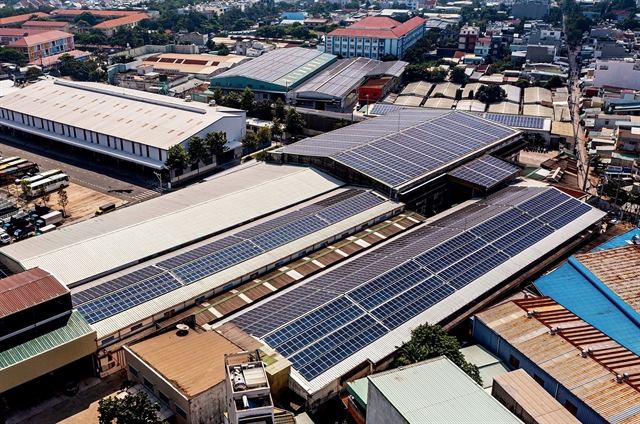 Economy
Economy


|
| Solar power systems installed on the rooftops of buildings. VNA/VNS Photo |
HÀ NỘI — Rooftop solar power enterprises are now facing not only construction and legal entanglements but also high interest rates, said industry insiders.
Since the Government's Decision No. 13, dated April 6, 2020, on the mechanism to encourage the development of solar power in Việt Nam took effect, more than 4,000 solar power systems have been invested in Bình Dương Province, with a total capital of about VNĐ12 trillion (US$51.1 million).
According to the Department of Industry and Trade of Bình Dương Province, businesses in the area have developed more than 800 MWp of rooftop solar power, providing about 1.2 billion kWh of electricity per year.
However, problems arose after projects were completed for installation and were connected, as Vietnam Electricity Southern Power Corporation required the investors to complete legal documents, including fire prevention and construction permits.
A recent issuance from the Southern Power Corporation has sparked concerns among investors. It said that from April 1, payments for rooftop solar power projects that fail to fill out their documents will be halted, and after June 30, the contract will be suspended while connectors are separated from the grid.
Representatives of companies investing in rooftop solar power participated in a dialogue with the Bình Dương Department of Construction on March 23 about difficulties and problems related to the investment order and the issuance of construction permits for the system.
The parties, however, still haven’t reached a consensus, said Nguyễn Khánh Toàn, director of Hoang Ngan Phat Electric Co., Ltd., a representative of 20 businesses investing in rooftop solar power in Bình Dương Province.
The reason is that rooftop solar power businesses identify rooftop solar power systems as technological equipment installed on the roofs of construction works.
Meanwhile, the Bình Dương Department of Construction issued a document saying that the systems are construction works, which are grade IV energy works, so the investment process must follow procedures and apply for a construction permit.
This is the biggest challenge for businesses operating in the field of rooftop solar power, Toàn said, adding that in Decision No. 13, a rooftop solar power system is defined as a system with solar panels installed on the roof of the building. And according to the Construction Law, the rooftop solar power system is not construction work because it is not linked to and positioned on the land.
A law firm hired by Vietnam Electricity (EVN) to advise on this issue suggested EVN propose to the Ministry of Industry and Trade that a rooftop solar power system be defined as a technological device. Therefore, the definition by the Bình Dương Department of Construction has caused great risks to the units that have invested in the rooftop solar power system, Toàn said.
According to Toàn, of the total investment in the province’s rooftop solar power system, more than VNĐ8 trillion are loans from credit institutions with relatively high interest rates.
"The conflict in regulations relating to the construction of rooftop solar power systems, in general, creates risks for investors and the banks that have financed the projects," Toàn said.
Sharing a similar concern, Phan Thanh Lâm, director of Binh Duong Green Energy Production, said that most of the province's rooftop solar power projects invested are being financed by bank loans, but interest rates are now high.
At the conference connecting rooftop solar power businesses and banks on March 22, Vice Chairman of the provincial People's Committee Nguyễn Văn Danh told attendees that the province met with the Southern Power Corporation to solve this issue.
In addition, there will be no payment postponement or disconnection for rooftop solar power projects as announced, and customers who have signed the contracts will receive payments normally.
"With particular regard to the regulatory documents of the Department of Construction, the province will consider and make adjustments to remove the common entanglements," said Danh. — VNS




